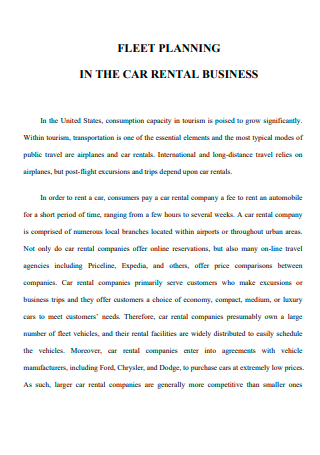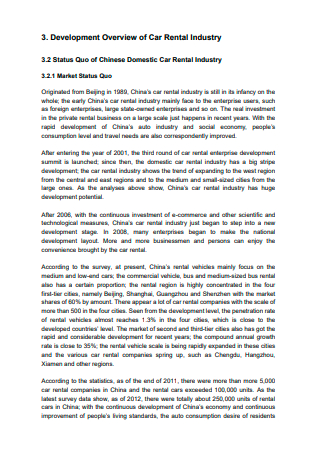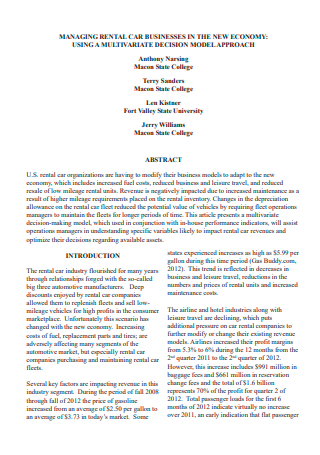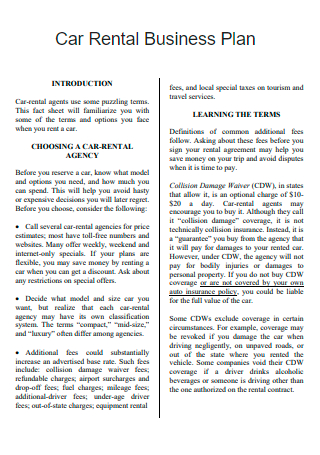3+ Sample Car Rental Business Plan
FREE Car Rental Business Plan s to Download
3+ Sample Car Rental Business Plan
Car Rental Business: What Is It About?
Things to consider when planning your own Car Rental Business
Making the Car Rental Business Plan
FAQs
What are the different types of rental vehicles used commonly by car rental agencies?
What do customers need to know before renting a car?
What are the common requirements when renting a car?
What are some of the legal documents required to start a car rental business?
Car Rental Business: What Is It About?
A car rental business, or a car rental agency, rents out vehicles to the general public in a stipulated period of time. Rent period often ranges from hours, to weeks, to months, or even years, depending upon the need of the customer. Often situated near airports or urban areas, a car rental business’s greater number of customers usually comes from out of town travelers. Car rental agencies also cater group or party bookings through van rentals, and as well as the moving industry through truck rentals. Cars available for individual rent range from luxury type, economical type, Sports Utility Vehicle, and even Multi Utility Vehicle. Aside from renting out vehicles, most car rental agencies also offer some added-value services, such as an installed GPS (global positioning system), mobile Wi-Fi, insurance policies, damage repair services, child safety seats, and even the convenience of making car reservations and having support through their online websites.
Global Newswire in an article states that, “Renting automobiles is considered to be a more cost-effective alternative to owning a vehicle as it offers freedom of movement, low-cost traveling and enables the evasion of high ownership costs.” The increasing tourism industry and the increasing population are the key factors driving the growth of the car rental trade. Travelers love the cost effective and time-saving benefits of renting a car. Aside from that, they don’t have to worry about maintenance and repair since these are already covered by the agency. Plus, the fact that they have a wide range of vehicles to choose from, travelers can choose to travel in comfort and in style as they wish at any time and anywhere.
Things to consider when planning your own Car Rental Business
A car rental business can be a profitable business, depending on how much effort you put into it. Of course, setting up a business is more than just permits and licenses involved. You have to be aware of what you’re dealing with, the whole ins and outs of a car rental operation. You have to consider all the driving factors that could make or break your business. There’s more to operating a car rental business than just letting your customers sign the papers and handing the keys over to them. Knowing that you’re not the only one in business for renting out vehicles, what are the other factors that could affect your operation? What are some of the things you need to give much thought on when starting up a car rental business?
Making the Car Rental Business Plan
Before taking it head on and start running your car rental business, you need to have a good business plan handy. A business plan is your roadmap that stirs you throughout your entrepreneurial journey in the car renting industry. It guides you through the starting up process, the operation, and making sure that aside from making your business run successfully, it should also be sustainable in the long run. A car rental business can be very challenging, competitive, yet lucrative at the same time. As a business owner, you should be aware of the market conditions of the industry that you are getting into, and to have, of course, a well-drafted business plan. Below are the usual steps on how to make that effective car rental business plan.
Step 1: Create an Executive Summary and the Business Overview
An executive summary briefly outlines the overall goals of your business. It should state what are your business’s objectives and its market viability. A business overview is the background information about the company, the management team, and what kind of business you serve. For your car rental business, write in short and concise sentences what are the overall goals you hoped to achieve in your business, such as projected profit revenue in a certain time period, brand and customer loyalty, and a sustainable business. For your overview, write down the business name, a detailed summary of the management team, and a brief description of what kind of car rental business you’re in, whether you’re a traditional car rental business, franchise, dealership, et cetera.
Step 2: Do a Market Analysis
Doing a market analysis helps you understand the viability of the car rental business you’re planning to get into. It helps you analyze the current market’s condition, its potential customer size, projected profitability, and how it’s going to be sustainable. To do a market analysis, assess first the size of your market. You need to determine who is your target market by doing a market segmentation through demographics classification. Next is to identify what type of need they have for a car rental business. What is their purpose for renting a car? Is it for work? For long distance traveling? For luxury and entertainment use? For relocating and moving out? Find out next who are your potential competitors in the area. Find out how much are your competitors profiting from the business, and what is their average rate of customers. This information would be useful later on when coming up with your marketing strategies.
Step 3: Prepare your Marketing Plan
Your car rental marketing plan is your steps toward achieving your business goals within a given timeframe. This includes creating your marketing strategies. For each marketing strategy, describe how they will be implemented, who will be tasked to do it, and for how long it will last. For your car renting business, your aim is to reach a certain amount of profit within a year. To achieve that, your marketing plan should involve aggressive marketing strategies. First off, you need to create a catchy brand name for your business, with a logo and a slogan that appeals to the general public. Next, list down your marketing strategies. You could do active website advertising agreement campaigns to promote your business or through the different social media platforms, TV or radio broadcasts, flyering, et cetera. You could also do pricing strategy, by comparing prices against your competitors and see how you can adjust your prices to better appeal to the public. Another strategy is to offer promos and value-added services. You could offer discounts for long-term renting customers, and value-added services such as free fuel for every returning customer, and so on.
Step 4: Financial Planning
To run the whole operation of your car rental business, you need to know the costs and expenses behind it. These are your overall estimated costs projection so that you could also estimate the capital you need to fund the business. Start off your financial plan, write down each item of expenditure. This could be done in a financial statement format. For your car rental business, your expenses are purchase and maintenance of vehicles, office and parking lot rentals, employees’ salaries, office utilities and maintenance, machinery and equipment, promotional and marketing campaign expenses, and so on. Compare the estimated costs and expenses against your capital fund, and see if there is a potential profit, a break even, or a lack of funding. Based on your financial projections, make some adjustments to your marketing plan to be able to realistically achieve your business goals of profit and sustainability.
FAQs
What are the different types of rental vehicles used commonly by car rental agencies?
Some of these are the economy, compact, standard size, luxury, SUV, mini van, and full size van. Economy vehicles can usually accommodate 2 adults and 2 children. Some examples of economy vehicles are Hyundai Accent and Suzuki Swift. Compact, such as a Ford Escort, can accommodate the same number of occupants. Standard size, like the Nissan Altima, can accommodate 5 passengers. Luxury vehicles, like the Rolls Royce Phantom, can comfortably fit in 6 passengers. An SUV, like the Chevrolet Blazer, fits 5 passengers. And a minivan and a full size van can accommodate a family or group of 8-15 passengers.
What do customers need to know before renting a car?
Customers need to be careful and ask the right questions when approaching a car rental agency. They wanted to make sure that the car that they will be renting will fit their needs perfectly. As a customer, you need to find out the following: the total cost of the rent, including any other fees such as tax, insurance fees, et cetera; if the vehicle needs to be returned on a full tank basis; the daily mileage limit, if any; and the process of returning the car, if there are pick up options or return it to the shop directly.
What are the common requirements when renting a car?
The number one requirement to have when renting a car is a valid driver’s license. Other requirements can be minimum age requirement in the location where the car rental shop is located; a major credit card under the name of the person renting the car; and the amount of deposit required.
What are some of the legal documents required to start a car rental business?
Permits, licenses, and registration vary from state to state, or from country to country. Common documents, though, are the local government business permits, permits relating to zoning laws, and health and safety permits. If your business has employees, you will be required to avail of a federal tax ID number and a state tax ID number. Insurance coverage is also required in some states as a requirement when opening up a car rental business; this is to ensure that customers are covered in case of accidents or damages.
The car rental can be a lucrative type of business to get into, as long as you put in lots of effort into running the business. As the population continues to grow, as well as the tourism industry, if you know how to play your cards right as a car rental business owner, you could see your business growing successfully as well. Customers are after the convenience and the value for their money the car rental agencies offer to them. That’s why when you’re the owner of a car rental business, make sure that your plan and strategies for running your business are aligned with your customers’ needs. And to do so, you need the help of a good car rental business plan.
Check out our available car rental business plan templates that are ready for download. It is easy to use, and more importantly, it serves as your guide throughout your business process. So, download one now, and start taking those steps towards a successful car rental entrepreneurship journey!




